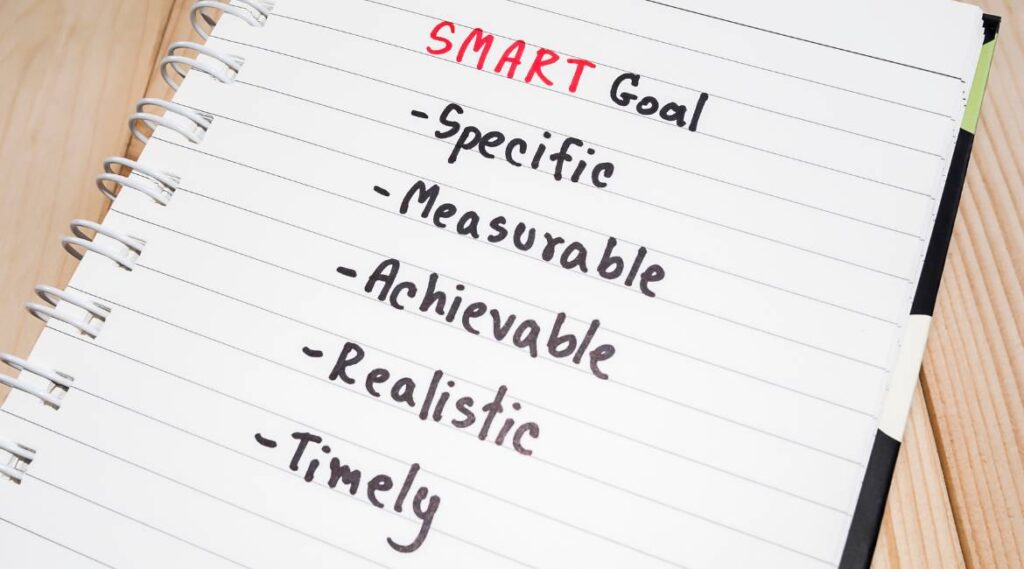7 Essential Steps to Creating Successful Goals
Creating goals is a great way to focus your energy and achieve success. However, many people struggle with setting realistic and achievable goals. If you find it difficult to create successful goals, read on for some tips. With some planning and effort, you can reach any goal you set your mind to!
This post may contain affiliate links. That means that if you click on a link and purchase something I recommend, I will receive a small commission at no extra cost to you. As an Amazon Associate, I earn from qualifying purchases. This helps keep my website up and running and is very appreciated. Thank you for your support! You can read my full disclosure policy here.
Do you ever feel like you are floating through life without any direction? Or you know what you want but have no idea how to get there. If so, have you considered setting goals?
If you want to become successful, setting goals is vital! They give us direction, motivation, and focus. By setting goals, we are creating a target to aim for! Without goals, it becomes harder to reach our full potential, and success, more often than not, boils down to luck!
However, it’s more complex than just writing down our goals. Understanding the importance of goals and the techniques involved in creating achievable goals is essential for success! The following article outlines seven critical steps to setting goals that will help you reach your full potential!
Why should we create goals?
Setting goals is essential for our development and success. Goals help us create a road map for success. They give us a target to aim for and help us see where we are going and what we need to do to get there!
For years, I wanted to become a nurse. However, I continued working as a health care assistant for 12 years before I did anything about it! Now, I did enjoy being an HCA, but it just wasn’t fulfilling me mentally. I was always saying I would go and start my nurse training, but I was filled with self-doubt and never put a plan in place to do so.
It was only after I got divorced that I had to take a good, hard look at my life and decided to plan out my future. It was then that I created my 5-year plan to become a qualified nurse. Four years later, I graduated with a 1st class honours degree and started working as a scrub nurse at my local hospital.
Previously, I had never thought that that was even possible. However, by making clear actionable goals and an action plan, I eventually reached my dream of becoming a nurse, qualifying two days before my 40th birthday!
Without sitting down and looking at what I wanted to achieve and making a clear action plan for how I would achieve it, I would still be working as an HCA.
How to create successful goals
A goal can be many different things, but one thing it’s not is a dream! A dream is something we desire, whereas a goal is something specific and measurable. For example, if you dream of owning your own home, your goal could be to save £20,000 in 3 years for a deposit.
Although your primary goal may be big, setting smaller goals is the best way to get there. As you achieve smaller goals, you can set others, eventually leading you to that bigger goal.
So, how do we set goals? Here are seven essential steps to help you create achievable goals that will put you on the path to success, whatever that may be!
Evaluate your situation
One of the first things you need to do before setting goals is reflect and evaluate your current situation. You must understand what you want to achieve and what has previously been holding you back from achieving it.
Take a moment to evaluate all your strengths and weaknesses, past mistakes, limiting beliefs, and possible roadblocks. By doing so, you will have a better understanding of your mindset and what you may need to change to move forward and work towards your dreams.
Once you have decided on what you want to achieve, ask yourself the following questions:
- Is this goal something you want?
- Are you willing to pour all your efforts into achieving this goal?
If the answer is no to any of these questions, these aren’t the right goals for you and are not worth pursuing. Sometimes, we think we want to achieve something, but when we think about it, we don’t. Sometimes, our dreams and ambitions are influenced by someone else. You must take a really good look inside and think about what YOU want to achieve! If you don’t, you aren’t likely to stay motivated enough to get to the finish line!
Make SMART goals

Once you know what you want to achieve, write down a list of all your goals. This list may be overwhelming, but remember, you don’t have to reach all of them at once.
Put these goals in order of importance, and then pick one you want to focus on first. Once you have your first goal, you must ensure it’s SMART!
A SMART goal is used to help guide goal setting. SMART is an acronym for Specific, Measurable, Achievable, Realistic, and Timely. Therefore, a SMART goal incorporates all of these criteria to help focus your efforts and increase the chances of achieving your goal.
- Specific – Goals should be specific, well-defined, clear, and unambiguous
- Measurable – Goals should be measurable against a given set of criteria.
- Achievable – Goals should be attainable and not impossible to achieve.
- Realistic – Goals should be realistic and within your reach.
- Timely – Goals should have a clearly defined timeline with a start and end date.
For example, if your goal is to save money for a house deposit:
The goal is to save £30,000 over three years. This goal is clearly defined and has a clear timeline with an end date. However, this means saving on average £833 a month. Is this realistic and attainable? Do you have enough income to cover this? If not, it is doubtful that you will succeed, so you may need to adjust the timeline or amount you wish to save.
Write it down
Once you have decided on your goals and are happy they are attainable, you must write them down and keep them visible.
Writing down our goals helps us clarify and strengthen our intentions. A constant reminder also helps us stay motivated, stay focused and avoid distraction. It affirms purpose and keeps us on track.
Break it down
Breaking down our goals into smaller, manageable chunks helps us focus on smaller, manageable, more achievable pieces. It makes the end goal seem more manageable and easier to achieve.
There are various ways to break down big goals, such as adjusting the time frame or making a 10-step plan focusing on reaching one step at a time.
As you reach each goal, you will have small achievements that you can celebrate, reinforcing your belief that you are on the right track and on target to reach the end goal.
Hold yourself accountable
These are your goals, and nobody else can help you achieve them. It’s up to you to make sure that you stick to the plan and stay motivated to keep going. Only you have the power to change your life. People may give you a helping hand throughout the process, but ultimately, it’s up to you to get it done!
While there are some instances where things happen out of your control, how you respond to those circumstances and decide to approach these situations is entirely up to you. If you do come across challenges that jeopardise your goals, keep the focus, remember why you’re doing it in the first place and embrace it, work with it, and allow yourself to succeed.
One way to hold yourself more accountable is to share your goals with others. You could also assign consequences for failing to reach your goals or losing motivation.
Reward yourself
As and when you reach your smaller goals, allow yourself to celebrate. This helps you recognise that what you do is good and beneficial in reaching your end goal. This also gives you an incentive, something to look forward to, providing you with more motivation to keep going!
Develop healthy habits
When you have several goals that you are trying to achieve, it’s essential to have healthy habits which can help you remain positive and stay on track. Many of us struggle with progress due to self-doubt and limiting beliefs. If this is the case, it’s important to look at your everyday habits and ask yourself if they are helping or discouraging you from reaching your full potential.
Healthy habits and behaviours drive us forward, encourage us to stay on track, maintain a positive mindset, and nudge us towards our desired outcomes. Therefore, to reach our full potential, we must get rid of those negative habits and beliefs and replace them with positive ones.
Final thoughts
Many of us struggle with progress due to self-doubt and limiting beliefs. If this is the case, it’s essential to evaluate your daily routines and consider whether they support or hinder your potential. Positive habits and behaviours propel us forward, foster a positive mindset, and guide us towards desired outcomes. Therefore, we must eliminate negative habits and beliefs and adopt positive ones to unlock our full potential. Setting goals provides a clear direction and short-term focus, helping us achieve success in the long run.
Remember to check out our related resources for more tips and guidance on this important topic. Take control of your life and embrace a brighter future!
Thanks so much for stopping by; I appreciate everyone who takes the time to read and make it to the end! I have lots of exciting new content in the next few weeks, so make sure you pop back to catch up!









